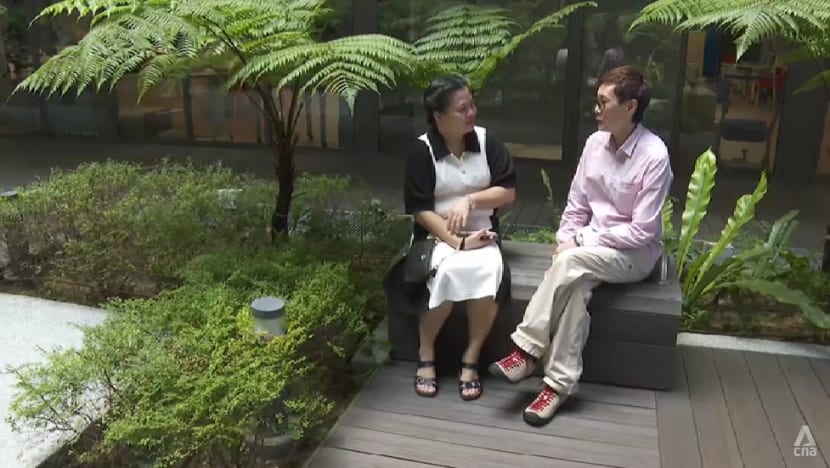‘No strings attached’ cash aid helps lower-income households' mental health, job security: AWWA study
When assistance is offered upfront to relieve needy families of their financial burdens, they are able to hold out for better jobs, said one analyst.

Madam Wong Lai Ching (left), whose family benefited from social service agency AWWA’s family empowerment programme, speaking with Ms Michele Gan (right), senior social worker at AWWA Family Service Centre.

This audio is generated by an AI tool.
SINGAPORE: Making ends meet has been difficult for beautician Wong Lai Ching, who is the primary caregiver for her family, including her elderly parents and a son with special needs.
But things finally improved when she started receiving S$550 (US$410) a month in unconditional cash aid through social service agency AWWA’s family empowerment programme, the 44-year-old told CNA.
The mother of three children aged between 10 and 21 said the support enabled her to provide for the family’s needs and resolve financial arrears. With improved job stability, she has also settled outstanding credit card debts.
Now, she has a sense of security that she did not have before, noted Madam Wong.
“I don’t need to be scared when I (visit) the hospital and talk to the emergency (ward),” she added.
“I (do not need to ask if I can) pay later because I don't have enough money to pay. Now with this money, I can pay first.”
A study by AWWA has found that unconditional cash aid - where recipients do not need to first secure employment or meet other conditions to get the funds - can help lower-income families have better job outcomes and mental health.
It measured outcomes for 75 lower-income families that received such help through the family empowerment programme. These households were given between S$300 and S$550 a month, over a period of one-and-a-half years between May 2022 and November 2023.
The agency tracked various indicators such as employment, health, and food security.
WHAT THE STUDY FOUND
Ms Huixia See Toh, director of family services at AWWA, said that those in chronic poverty are constantly struggling to meet urgent needs.
“That actually also affects cognitive functioning and the bandwidth to even plan and invest for the future,” she added.
“Even though there are existing funding programmes around, they may be quite specific in terms of use, and also they may be short term. So we were very interested to see how longer-term unconditional cash transfers may support or impact our families,” she noted.
Ms See Toh said the programme aims to give recipients the flexibility to look for good jobs and prioritise their family’s needs.
Some of the top spending areas included food, groceries, transportation and childcare needs, she told CNA’s Singapore Tonight on Wednesday (Jul 17).
The study also found that over 18 months, mental health improved for participants who received the cash, compared with a control group of 93 families.
About 60 per cent of them described themselves as psychologically well, compared to 36 per cent of the control group.
Participants who got the cash assistance had better job outcomes as well, working more hours a week and earning higher wages.
According to the study, 27 per cent of the recipients found work with contracts that were more secure, as compared with 15 per cent of the control group.
More than 20 per cent of them saw their relationship with their spouse improve, twice that of the control group. Relationships with their children also improved.
Women benefited in particular. They gained greater control over their finances, felt more independent, and were motivated to find better work.
“CASH IS A POWERFUL RESOURCE”
Researchers said the cash aid gave caregivers flexibility in planning their finances, as well as mental bandwidth to think about the future.
“Some managed to save in terms of paying for insurance premiums for their kids. Some of them put it into a bank,” said Ms Michele Gan, senior social worker at AWWA Family Service Centre.
“Savings can also be, in a way, like helping them to pay off some of their debts and arrears.”
Ms Gan noted that such programmes should also come with guidance to teach families how to use the money wisely.
Temasek Trust, the philanthropic arm of state investor Temasek, has pledged another S$750,000 for AWWA’s family empowerment programme to continue. The programme received its first round of funding of S$750,000 from Standard Chartered Bank.
“Sometimes in social assistance, there is the idea that lower-income persons should be encouraged to get off assistance and should be encouraged to get back into work as soon as possible. So that's the idea that any work is better than no work,” said Dr Ng Kok Hoe, senior research fellow and head of the Case Insights Unit at the National University of Singapore’s Lee Kuan Yew School of Public Policy.
He added that this idea is “not always true”.
“When people are kind of under the pressure of a financial crisis, they often feel compelled to take the first job they come across, even if it's a poor job. Then they end up in a cycle of short episodes of poor work, unemployment and so on,” he noted.
Dr Ng, who was involved in the study, said when assistance is offered upfront to relieve needy families of their financial burdens, they are able to hold out for better jobs.
He also expressed his belief that Singapore can continue to uplift lower-income families by redesigning social assistance policies and providing decent jobs.
Assistance should be sustained over a longer period, he noted.
“It should be continuous and assured, meaning that it shouldn't require frequent trips back to an office to file an application, not knowing whether the money will keep coming.”
The form of assistance is also important, he stressed.
“Cash is a powerful resource, because it offers flexibility and of course control. Services and subsidies are important too, but cash assistance often gives families a form of leverage that other forms of help do not.”
Dr Ng added that long-term income stability requires offering good jobs.
“That means setting clear standards for decent work such as stability, wages, social protection and so on,” he said.

















